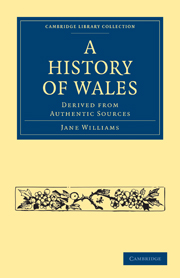Book contents
- Frontmatter
- PREFACE
- Contents
- CHAPTER I THE CYMRY OF ANCIENT BRITAIN
- CHAPTER II THE CYMRY AND THE ROMANS, B.C. 53—A.D. 54
- CHAPTER III THE CYMRY AND THE ROMANS, A.D. 54—96
- CHAPTER IV THE CYMRY AND THE ROMANS, A.D. 96—306
- CHAPTER V THE CYMRY AND THE ROMANS, A.D. 306—411
- CHAPTER VI THE CYMRY IN THE FIFTH CENTURY
- CHAPTER VII THE CYMRY AND THE SAXONS, A.D. 500—566
- CHAPTER VIII THE CYMRY AND THE SAXONS, A.D. 566—634
- CHAPTER IX THE CYMRY AND THE SAXONS, A.D. 634—819
- CHAPTER X THE CYMRY, THE SAXONS, AND THE DANES, A.D. 819—915
- CHAPTER XI THE CYMRY AND THE SAXONS, A.D. 915—948
- CHAPTER XII THE CYMRY, THE SAXONS, AND THE DANES, A.D.
- CHAPTER XIII THE CYMRY AND THE SAXONS, A.D. 1039—1063
- CHAPTER XIV THE CYMRY AND THE SAXONS, A.D. 1063—1091
- CHAPTER XV THE CYMRY AND THE NORMANS, A.D. 1091—1112
- CHAPTER XVI THE CYMRY AND THE NORMANS, A.D. 1091—1112
- CHAPTER XVII THE CYMRY AND THE NORMANS, A.D. 1137—1169
- CHAPTER XVIII THE CYMRY AND THE NORMANS, A.D. 1169—1194
- CHAPTER XIX THE CYMRY AND THE NORMANS, A.D. 1194—1240
- CHAPTER XX THE CYMRY AND THE ANGLO-NORMANS, A.D. 1240—1246
- CHAPTER XXI THE ANGLO-NORMANS AND THE CYMRY, A.D. 1246—1276
- CHAPTER XXII THE ANGLO-NORMANS AND THE CYMRY, A.D. 1276—1282
- CHAPTER XXIII THE ANGLO-NORMANS AND THE CYMRY, A.D. 1282—1287
- CHAPTER XXIV THE PLANTAGENET PRINCES AND THE CYMRY, A.D. 1327—1422
- CHAPTER XXV THE PLANTAGENET PRINCES AND THE CYMRY, A.D. 1422—1485
- CHAPTER XXVI THE TUDOR DYNASTY, A.D. 1485—1603
- APPENDIX
- INDEX
CHAPTER XXII - THE ANGLO-NORMANS AND THE CYMRY, A.D. 1276—1282
Published online by Cambridge University Press: 16 May 2011
- Frontmatter
- PREFACE
- Contents
- CHAPTER I THE CYMRY OF ANCIENT BRITAIN
- CHAPTER II THE CYMRY AND THE ROMANS, B.C. 53—A.D. 54
- CHAPTER III THE CYMRY AND THE ROMANS, A.D. 54—96
- CHAPTER IV THE CYMRY AND THE ROMANS, A.D. 96—306
- CHAPTER V THE CYMRY AND THE ROMANS, A.D. 306—411
- CHAPTER VI THE CYMRY IN THE FIFTH CENTURY
- CHAPTER VII THE CYMRY AND THE SAXONS, A.D. 500—566
- CHAPTER VIII THE CYMRY AND THE SAXONS, A.D. 566—634
- CHAPTER IX THE CYMRY AND THE SAXONS, A.D. 634—819
- CHAPTER X THE CYMRY, THE SAXONS, AND THE DANES, A.D. 819—915
- CHAPTER XI THE CYMRY AND THE SAXONS, A.D. 915—948
- CHAPTER XII THE CYMRY, THE SAXONS, AND THE DANES, A.D.
- CHAPTER XIII THE CYMRY AND THE SAXONS, A.D. 1039—1063
- CHAPTER XIV THE CYMRY AND THE SAXONS, A.D. 1063—1091
- CHAPTER XV THE CYMRY AND THE NORMANS, A.D. 1091—1112
- CHAPTER XVI THE CYMRY AND THE NORMANS, A.D. 1091—1112
- CHAPTER XVII THE CYMRY AND THE NORMANS, A.D. 1137—1169
- CHAPTER XVIII THE CYMRY AND THE NORMANS, A.D. 1169—1194
- CHAPTER XIX THE CYMRY AND THE NORMANS, A.D. 1194—1240
- CHAPTER XX THE CYMRY AND THE ANGLO-NORMANS, A.D. 1240—1246
- CHAPTER XXI THE ANGLO-NORMANS AND THE CYMRY, A.D. 1246—1276
- CHAPTER XXII THE ANGLO-NORMANS AND THE CYMRY, A.D. 1276—1282
- CHAPTER XXIII THE ANGLO-NORMANS AND THE CYMRY, A.D. 1282—1287
- CHAPTER XXIV THE PLANTAGENET PRINCES AND THE CYMRY, A.D. 1327—1422
- CHAPTER XXV THE PLANTAGENET PRINCES AND THE CYMRY, A.D. 1422—1485
- CHAPTER XXVI THE TUDOR DYNASTY, A.D. 1485—1603
- APPENDIX
- INDEX
Summary
Why then doth Flesh, a bubble glass of breath,
Hunt after honour and advancement vain,
And rear a trophy for devouring death
With so great labour and long lasting pain,
As if his days for ever should remain?
Sith all that in this world is great or gay,
Doth as a vapour vanish and decay.
Spenser: Ruines of Time.§ 1. The next summons addressed to the Prince of Wales ordered him to appear at Winchester on January 20, 1276, to do homage, and it was answered only by repetitions of the reasons formerly assigned for non-attendance.
King Edward then proceeded to summon him to appear at Westminster within three weeks after the festival of Easter. On April 19, therefore, the Dean and Chapter of Bangor wrote a letter to the Archbishop of Canterbury intended to exculpate the Prince of Wales from a charge of contumacy, and to impress upon the primate the truth and importance of the statements made by that prince six months before. The dean and chapter in their letter detail the particulars of Prince Dafydd's conspiracy, the temperate measures taken by Llewelyn on that occasion, the defection of the Prince of Powys Isaf, and the confession of his son Owen.
This letter affected the archbishop so much that, together with several bishops and earls, he obtained the king's permission to endeavour to persuade Llewelyn to do homage, and they consequently sent the Archdeacon of Canterbury on repeated missions to him.
- Type
- Chapter
- Information
- A History of WalesDerived from Authentic Sources, pp. 396 - 417Publisher: Cambridge University PressPrint publication year: 2010First published in: 1869

